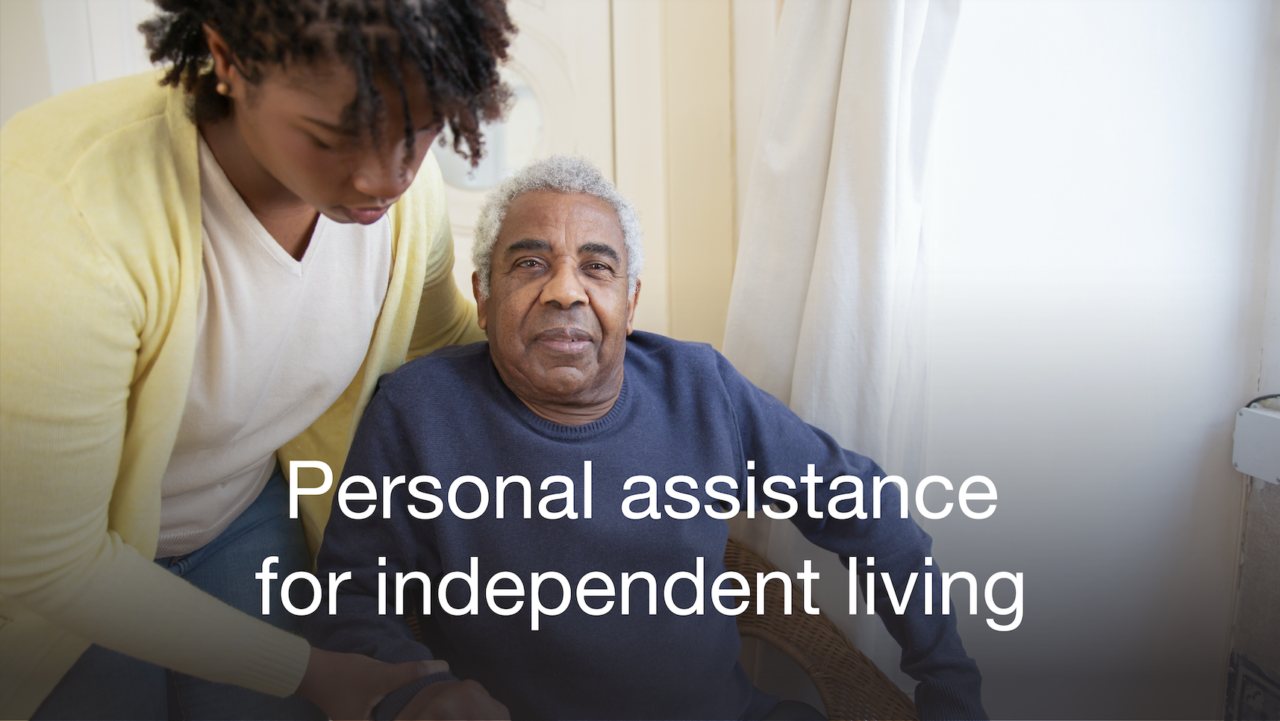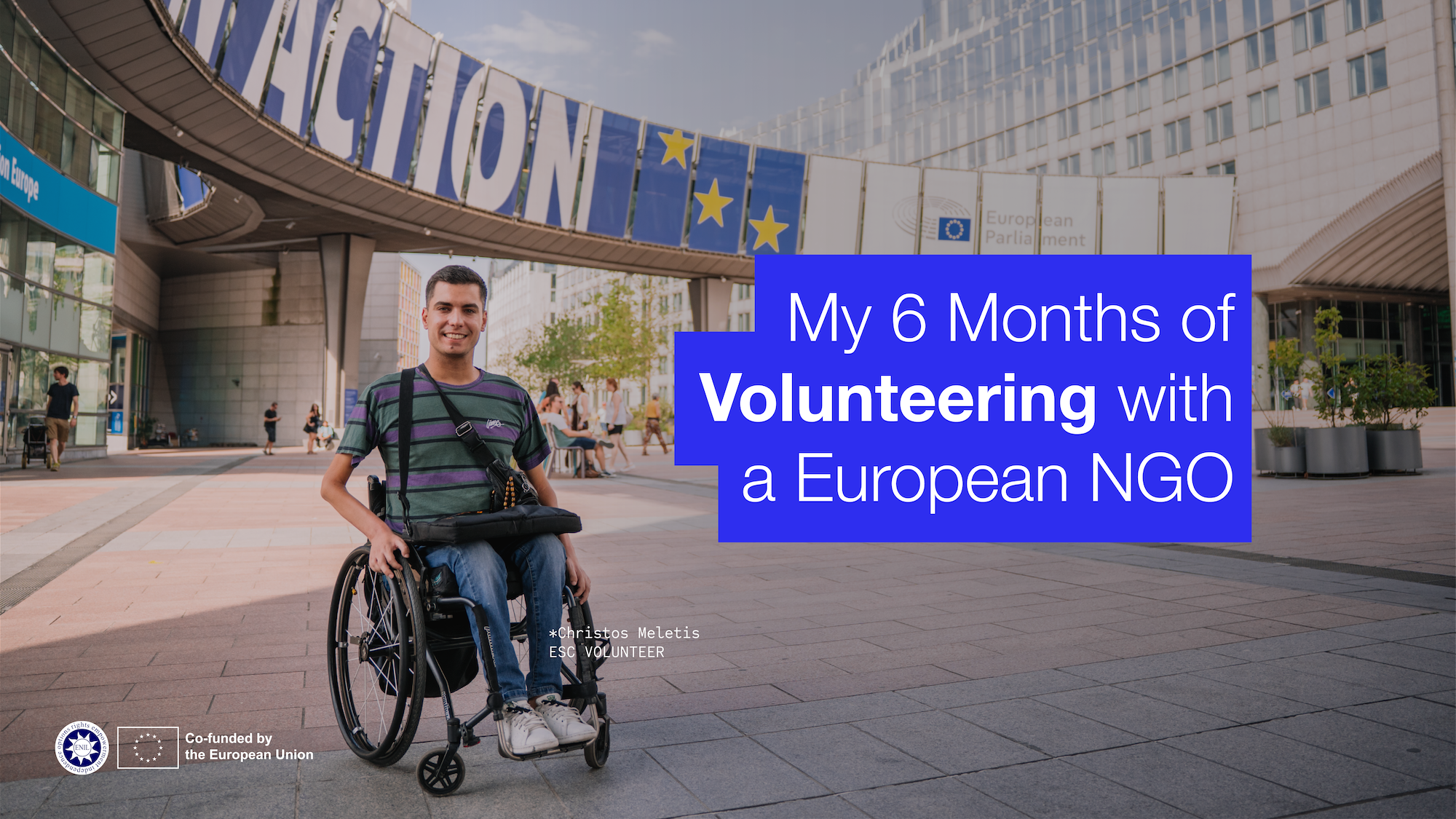Older disabled people have thus far been excluded from deinstitutionalisation and personal assistance. Given its transformative effects, the European Commission needs to advise member states to expand personal assistance schemes to allow more users and improve standards
Florian Sanden, ENIL Policy Coordinator, florian.sanden@enil.eu
On December 15, 2022, the European Network on Independent Living (ENIL) organised a webinar on the intersectionality of age and disability, a topic that has not yet fully entered the policy discourse. During the event, speakers highlighted the key role of personal assistance to enable all disabled people with support needs to live independently.
Throughout Europe 1,4 million disabled people under the age of 65 and up to 3 million people over the age of 65, many of which are disabled, live in institutions. Institutional environments have been shown to create additional impairments. The lack of personal life, lack of autonomy and lack of respect for personal integrity can impact emotional and social well-being and lead to various mental health problems such as aggressiveness and depression. People confined to institutions are cut off from self-determination which means they do not live independently and are excluded from the community.
According to the European Strategy on the Rights of Persons with Disabilities (ESRPD) the European Commission plans by 2023 to issue guidance recommending to Member States improvements on Independent Living and Inclusion in the Community. What can this guidance do to improve the lives of all disabled people, young and old?
The transformative effect of personal assistance
Adolf Ratzka was founding chair of ENIL from 1989-1992 and founder of the Stockholm Cooperative for Independent Living from 1984-1995 which introduced personal assistance in Sweden. During the webinar Ratzka talked about his experiences with PA. In 1961 Ratzka contracted polio at the age of 17 and was left largely paralysed. In 1966 he was one of the first people in Europe to receive personal assistance which enabled him to leave the hospital in which he had been living for five years. Personal assistance enabled him to move to the United States to study, to pursue a career in providing personal assistance to others and to advocate for disability rights in politics. According to Ratzka, personal assistance was also important for his marriage. Up until today it is usually family members and especially women who are expected to take care of disabled relatives. Due to personal assistance, Ratzka´s wife did not have to be his care assistant, a situation that can introduce toxic elements and even destroy a relationship. PA enabled a relationship involving a healthy degree of interdependence. Ratzka said that with the help of PA he has been able to do his part of the household chores. The decision taken by him and his wife to have a child was based on PA as well. Ratzka could contribute his share of the physical work of raising his daughter, by for example taking her to kindergarden in the morning. According to Ratzka, he has been living a full, rich life thanks to personal assistance.
During the webinar Melike Bal, member of the ENIL youth board from Turkey, talked about how she as a young disabled person provided support for her older disable uncle. Intergenerational support is very important for her and her family. However, it was to her mother to provide most of the care to her and her uncle. Taking care of two disabled relatives without support took a heavy toll mentally. Had personal assistance been available, the family´s quality of life would have improved considerably. True inclusion in the community would have been possible.
Research confirms that personal assistance is a key enabler of independent living (Stainton & Boyce 2004).
Availability of personal assistance in Europe
According to Ratzka, most countries do not offer personal assistance to people who acquire their disability after they have turned 65. The ENIL Independent Living Survey supports this statement. Out of 35 countries in the Council of Europe area that have publicly funded personal assistance schemes, only 15 allow disabled people over 65 access. Even if there is a legal entitlement, some countries do not approve personal assistance for older disabled people in practice. Some countries, such as Sweden, allow disabled people to keep their PA if it has been granted before the age of 65, implying that in certain countries disabled people lose their entitlement entirely. In 33 countries, access to PA-schemes is rated inadequate or insufficient, meaning that many disabled people with support needs remain excluded or that the quality of provision does not enable self-determination and independent living.
Consequently, disabled people with support needs have no choice but to resort to home care services or institutions. Home care services only offer support with basic activities, such as personal hygiene, dressing or warming up a meal. There is no support granted for out of home activities like going to work, pursuing education or travelling. The other choice is to go and live in an institutional setting.
Next to the well documented damaging effects de-facto, institutions are also unsustainable de jure. Art. 19 of the United Nation Convention on the Rights of Persons with Disabilities (UNCRPD), interpreted in General Comment no 5 and the Guidelines on Deinstitutionalisation, including in emergencies, forbids confining disabled people to institutional settings, including by failing to offer appropriate alternatives. When it comes to younger disabled people, the UNCPRD was successful in starting a debate and achieve some, even if very limited, results (Siska & Beadle-Brown 2020). Older disabled people have thus far been excluded from all attempts to reduce institutional arrangements. According to Ratzka, it was become a cultural norm to institutionalised older disabled people with support needs.
Independent Living and personal assistance for all Disabled People
According to General Comment no 5, “the right to live independently and be included in the community encompasses the protection of persons with disabilities belonging to any age group”. The Guidelines on Deinstitutionalisation, including in emergencies state that “all deinstitutionalisation efforts should include older persons with disabilities”.
It is therefore imperative that in its 2023 Independent Living Guidance to Member States, the European Commission advises governments to install personal assistance schemes that have the resources to support ALL disabled people in need. Such schemes should meet the following qualitative criteria:
- Under the scheme PA should be recognised as a right and be provided according to uniformly high standards.
- Disabled people in residential care settings have to receive active support in applying for PA.
- There must not be any restrictions on what PA can be used for. For example, assistants must be permitted to perform tasks related to health care, after appropriate training and approval by medical professionals.
- Resources to pay for PA must be dispersed directly to the user in the form of direct payments such as personal budgets.
- The PA funding has to allow users to cover all their needs in practice.
- There must not be any costs ceilings per user.
- Redirecting users towards residential care must be categorically forbidden.
- Persons with all types of impairments, physical, cognitive, sensory, psycho-social, neurodivergent, must have equal access.
- Assessments for eligibility and needs should be user led and aided by peers and professionals.
- Peers and professionals involved need to receive training on the Independent Living and the social model of disability.
- Assessment procedures must be straightforward and transparent.
- Applicants need to have access to adequate information and/or peer support before and during their assessment.
- The number of assistant hours per user needs to be unlimited and depend solely on individual needs.
- Applicants need to have access to fair and transparent appeal procedures.
- Users need to be able to choose who provides the PA services.
- Users must be able to keep their assistance when moving within or between countries.
- The quality of provision needs to be monitored by the users and/or users´ organisations, including Centres for Independent Living or by an independent body/agency.
- PA users need to have the option to receive trainings on how to manage their assistance.
- Users need to have access to peer support, i.e., support provided by other users of personal assistance.
- Users need to be able to select and hire their assistants.
- People with cognitive impairments need to be allowed to manage their own personal assistance.
- Users need to be able to determine the times when assistance will be provided without any restrictions.
- Users need to be able to freely decide where and how to access assistance.
- There should not be any specific qualification requirements to work as PA but assistants should have access to training.



